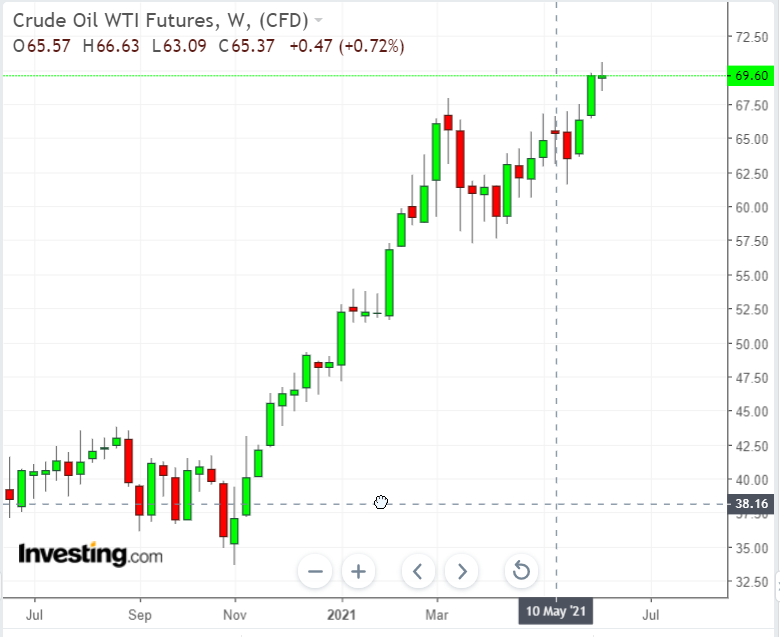Higher demand and the start of the summer driving season in the US are playing an important role in moving oil prices higher. WTI breached the $70 per barrel mark early on Wednesday, with Brent up to $72 per barrel.

Another player making its mark on rising prices is Iranian oil—or, rather, the continued lack of it—on the market.
When President Joseph Biden took office, the expectation was that his administration would move for a swift return to the JCPOA nuclear agreement and to end the US sanctions that prevent most countries from purchasing Iranian oil. We are now halfway through 2021, and negotiations between the US and Iran are moving slowly, with no discernable end in sight.
As such, traders will need answers to these important questions:
- When will the nuclear talks between the US and Iran conclude?
- Will sanctions be lifted? And if so, when?
- Who can be expected to buy Iranian oil?
- How much oil can Iran be expected to produce and export?
- How will Iran’s upcoming Presidential election impact the republic’s oil policy?
Status Of Iran’s Oil Exports And Storage
The lack of movement on the JCPOA negotiations between the US and Iran is causing logistical problems for Iran’s oil industry. Iran had been increasing the amount of oil it clandestinely exports. According to TankerTrackers.com, Iran exported 1.63 million bpd in March 2021, which is 600,000 bpd higher than it exported just five months earlier.
Once negotiations between the US and Iran commenced, Iran started cutting its exports, presumably because it hoped to put that oil on the market legally. Iran expected that the talks would be wrapped up in May. As a result of this expectation, the Islamic Republic only exported 900,000 bpd in May.
But, no deal was reached and now Iran has too much oil and condensate in inventory and nowhere for it to go.
According to TankerTrackers.com, Iran is now storing more crude oil onshore and even cutting production from its offshore fields. In addition, nearly the entire fleet of National Iranian Tanker Company (NITC) tankers is currently holding 70 million barrels of gas condensate near the port of Asaluyeh. Normally, these tankers would be transporting oil to China.
As the talks drag on, the question for Iran is whether it should export more oil covertly for less money. Alternatively, Iran could try to find more ships and continue building up its floating storage. An upward trend in oil exports from Iran in June could signal to traders that the country isn’t optimistic about resolving issues with the United States any time soon.
Importance Of Timing
According to a statement from Farokh Alikhani, the National Iranian Oil Company’s deputy for production, Iran can increase its oil output to 3.3 million bpd within one month and then up to 4 million bpd within two months after that. Some analysts are skeptical that Iran would be able to succeed with this very ambitious plan. Potential buyers are not making plans for immediate purchases. Other analysts believe that Iran can execute a swift return to the market, increasing production to its target number within 1-2 months.
Who Are Iran's Potential Customers?
Iran’s primary customer of sanctioned oil has been China. If Iran were to export more oil now at lower-than-market prices, China would likely buy it. Japan has indicated that it couldn’t resume purchases of Iranian oil until three months after sanctions are formally lifted, assuming they are lifted.
In May, two Indian refineries confirmed they were evaluating how they might reintroduce Iranian oil into their mix of crude oil purchases. Both are inclined to purchase Iranian oil under the right circumstances, but they would not indicate any expected time frame other than that it is possible this fiscal year. India was once a major buyer of Iranian oil before sanctions, and there have been tensions with some of India’s recent suppliers, specifically Saudi Arabia.
South Korea was also a major purchaser of Iranian gas condensates before sanctions. It will be a priority for Iran to offload its oversupply of condensates (from inventory) to customers like South Korea as soon as possible.
Upcoming Elections and Implications
Iran’s upcoming presidential election isn’t likely to change the course of Iran’s negotiations with the US, because that policy is set by the Supreme Jurisprudent and will likely remain consistent. The Supreme Jurisprudent is not an elected position.
Long Term Investment
Iranian oil minister Bijan Zangeneh has indicated that he plans to retire from his position as oil minister after the presidential elections. After the signing of the JCPOA and the end of international oil sanctions in 2015, Zangeneh vociferously supported opening Iranian oil assets to foreign companies with a new type of contract designed to provide foreign companies with more revenue from their investments over a longer period of time.
He fought with the government, arguing in favor of deals that would entice foreign companies to enter the country and provide Iran’s oil industry with needed investment and knowledge, but, to no avail.
Regardless of how the elections go, it’s unlikely that his replacement will be willing to push against the government’s protectionist attitudes. This means that few companies will be willing to make major investments in Iran’s oil and gas assets. Perhaps only Chinese and Russian state companies may be interested in taking that risk.
